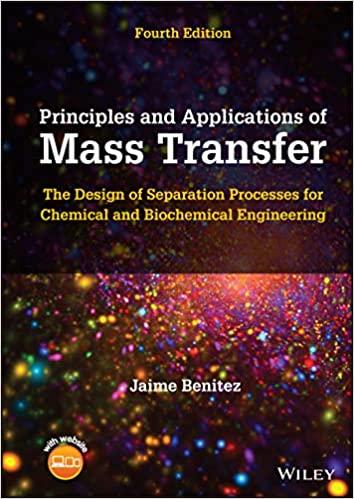Repeat Example 4.5 using the same airflow rate used in Problem 4.15 and specifying a chloroform removal
Question:
Repeat Example 4.5 using the same airflow rate used in Problem 4.15 and specifying a chloroform removal efficiency of $99 \%$.
Data From Example 4.5:-
Chlorinating drinking water kills microbes but produces trace amounts of a group of potentially harmful substances called trihalomethanes (THMs), the most prevalent of which is chloroform. Federal regulations in the United States limit total trihalomethanes (TTHMs) levels in drinking water to 80 μg/L. Sparging with ambient air in a bubble column is an effective method to strip the water of TTHMs.
A vessel 1.0 m in diameter is to be used for stripping chloroform from water by sparging with air at 298 K. The water will flow continuously downward at the rate of 10.0 kg/s at 298 K. The water contains 240 μg/L of chloroform. It is desired to remove 90% of the chloroform in the water using an airflow that is 50% higher than the minimum required. At these low concentrations, chloroform– water solutions follow Henry’s law (yi = mxi) with m = 220. The sparger is in the form of a ring located at the bottom of the vessel, 50 cm in diameter, containing 90 orifices, each 3 mm in diameter. Estimate the depth of the water column required to achieve the specified 90% removal efficiency. Estimate the power required to operate the air compressor if the mechanical efficiency of the system is 60%.
Step by Step Answer:






